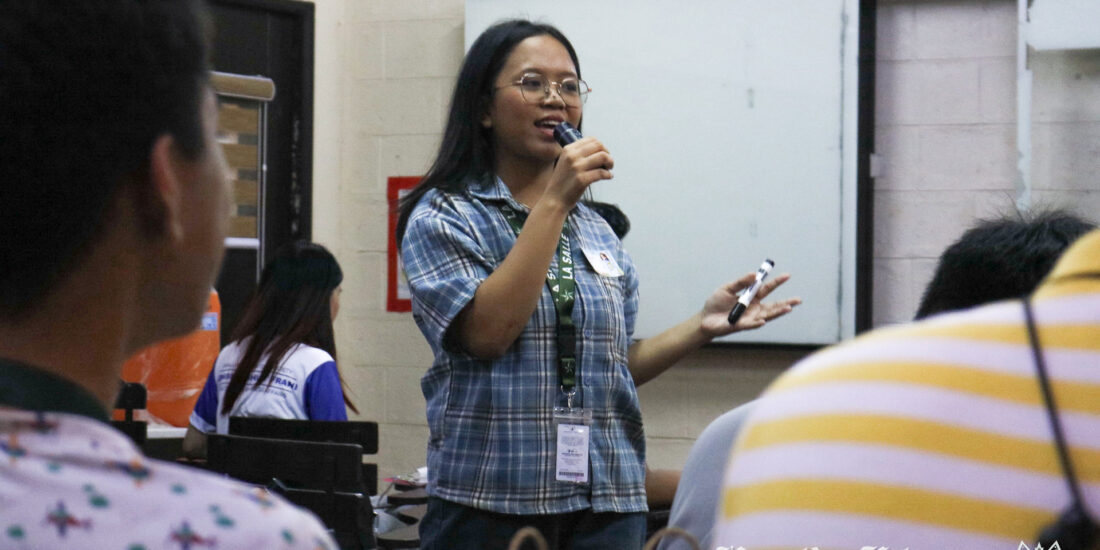Making ends meet
Special Report originally published in The HERALDO FILIPINO Broadsheet Vol. 35 Double Issue No. 1
The coronavirus disease 2019 (COVID-19) pandemic was a huge blow for private universities across the country, urging several schools to enforce provisional administrative measures to make ends meet. In DLSU-D, Center for Academics and Scholarship (CAS) was one of the offices who bore the impact of the crisis as the University decided to reduce its allocated budget for scholars, which leads to decreased scholarship benefits for the first semester of the academic year (AY) 2020-2021. With reduced grants and work-from-home setup, The HERALDO FILIPINO takes a closer look at how University scholars and administration bear with the challenges brought by the health crisis.
Decreased grants
In an online interview with The HERALDO FILIPINO, Scholarship Coordinator Linda Palomino said there are no 100 percent scholarship grants for Student Financial Aid (SFA) scholars, while slots for academic scholarship decreased for the current semester. She explained that this was due to the reduced budget allocation for scholars for the current AY.
Palomino then clarified that there is no significant difference in terms of number of scholars in comparison to the previous AY, but only in scholarship percentage and benefits given to students.
Instead of full scholarship grants for SFAs, CAS delegated a lower percentage to accommodate the needs of old and new scholars, with 50 percent being the highest scholarship offer for AY 2020-2021. The number of academic scholars were also reduced to 30 from the 40 grantees in the previous AY.
“During the costing namin, talagang hindi kakayanin ang 100 percent. We decided to give the most grant na pwede namin ibigay sa office is 50 percent para lahat sila ay ma-cater. And then, mayroon ding mga 25 percent and 10 percent,” she explained.
When asked how much from the budget in AY 2019-2020 was reduced, Palomino did not give specific figures and percentage of the budget reduction.
The HERALDO FILIPINO also sought the statement of the Finance and Accounting Office (FAO) on the budget allocation for scholars, but they have not responded as of press time.
Meanwhile, student-athletes have also encountered challenges as several sports leagues have been suspended during the pandemic.
This led the administration to temporarily dissolve the Sports Development Office (SDO), which is the umbrella department for varsity players, and to cut off athletes’ monthly allowances for the current AY.
However, Athletic Team Captain Mark Puspos mentioned that some benefits have been retained.
“Adjusting is [a] must in this time of pandemic. We need to work to feed ourselves and to sustain internet access for our online classes or assessments,” stated Puspos in an online interview.
While benefits for SFA grantees and student-athletes have been adjusted, Performing Arts Group (PAG) scholars maintained their scholarship status as is.
“They are still enjoying other benefits like exemption from attending Physical Education (PE) Nation Service Training Program (NSTP) classes, though they are required to accomplish some tasks implemented by the two offices before they finally get excused from attending synchronous and asynchronous classes,” Cultural Arts Office (CAO) Coordinator Joel Refuerzo shared.
USG financial grant program
Despite decreased scholarship grants, other opportunities remained for aspiring scholars. This included the University Student Government (USG)’s Financial Aid Grant Program, which aimed to provide P10,000 assistance to 20 bonafide students in the University.
The application period ran from January 4 until January 10 during the first semester of AY 2020-2021, making it the first student financial aid grant program launched by the USG since the ratification of the new constitution.
USG later announced that they will be increasing the number of financial aid grantees for the second semester of AY 2020-2021 from 20 to 40 students.
Work-from-home duties
As the pandemic limited face-to-face meetings to purely virtual interactions, students also faced adjustments in fulfilling their responsibilities as scholars, shifting to a work-from-home scheme for the first semester of AY 2020-2021.
According to Circle of Student Assistants (CoSa) President Rod Mascardo, CAS made significant adjustments in their duty hours in line with pandemic restrictions.
“Regarding our duty hours naman, it is greatly reduced. In my case, my duty hours should be 90 hours, but because of the new guidelines, 45 na lang po iyon,” Mascardo said.
He added that several of their duties remained, with most of the tasks being secretarial tasks for their respective departments.
As students are still banned from entering campus premises, student athletes have taken it upon themselves to do self-trainings at home since the quarantine period began.
Changes on scholarship process
In consideration to restrictions during the pandemic, the scholarship application process also faced adjustments as CAS lifted some requirements for AY 2020-2021.
This included the freezing of grade requirements for SFA scholars, as grades for the second semester of AY 2019-2020 have not been considered as a basis in granting their scholarship merits.
According to Palomino, CAS acknowledged the circumstances of students during the distance learning setup, especially at the height of the enhanced community quarantine (ECQ) where everyone was just adjusting.
Requirements such as performance evaluation at the end of the semester and home visitation for SFA scholars have also been relaxed.
Instead of home visitation, CAS assessed the application of SFA scholars through phone call verification in lieu of pandemic guidelines.
As the COVID-19 pandemic halted in-campus meetings, Palomino said digital means were utilized to submit scholarship requirements.
“Base(d) from my experience kasi, the application process was not difficult/complicated at all. It was easier pa nga po compared from the pre-pandemic time, which is good considering that our situation is difficult because of the pandemic,” Mascardo said when asked on the modified scholarship applications for the current AY.
On the other hand, the criteria for scholarship of PAG members were kept, which includes attendance and performance for 30 percent, and attitude and academics for 20 percent.
Hopes for on-site classes
As in-campus classes remain halted for the next semester, scholars expressed their hopes once the situation allows the face-to-face setup.
As athletes faced drastic adjustments during the pandemic, Puspos hoped that varsity scholars will regain their full benefits as soon as on-site classes resume.
In an interview with THE HERALDO FILIPINO, newly appointed OSS Dean Domingo Reblora Jr. said he cannot guarantee that similar benefits will be applied once face-to-face classes resume, as the administration is also dependent on the number of enrollees in the University.
“There are things that we are not so sure of yet right now because we are just speculating in the sense that yes we are going back to face-to-face classes, but the question is, do we still have the same number of students,” Reblora explained.
As for PAG scholars, Refuerzo said that students can expect “more intense, energetic, and passionate student artists” from their members once conditions allow.
“It is too early to plan at this time but just like before, meaningful and quality presentations and productions are expected to be delivered,” Refuerzo added.
* * *
No one was exempt from the changes brought about by the COVID-19 pandemic, and this included private universities and the scholarship opportunities they provide. In a crisis that crippled both the former educational setup and the old normal, it takes both efforts from the University and its students to make ends meet – with the University adjusting the requirements to better assist the students they serve, and the students working around the University’s reduced benefits and adjusted policies. As the pandemic posed many uncertainties, both scholars and the administration are left with no choice but to remain hopeful amid difficult times – that someday, making ends meet would not have to be the sole option anymore.
Photo by Miguel Luis Abenales





